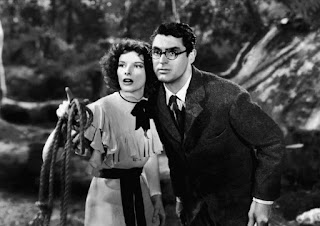 McKay is eager to perform the same trick again with Vice, a sporadically inspired but frustratingly blunt quasi-biography that feels to penetrate the skin of its subject or answer the big question of just what was the driving force behind the man who turned the symbolic position of Vice President into one of great power and influence. Rather than dig deeper, McKay prefers to allow Dick Cheney's actions to speak for themselves, occasionally cutting away to a visual metaphor, such as, in the case of Cheney's key meeting with Sam Rockwell's George W. Bush, a cheetah bringing down its prey. Cheney is a man McKay clearly views as a highly functioning psychopath, tracking his journey from working under Steve Carell's Donald Rumsfeld in the Nixon Administration, to his opportunistic lunge for control in the immediate aftermath of the 9/11 attacks. He fought to grant more power to a President he easily manipulated, praying on his short attention span and lack of political know-how, and to legalise torture, finding a massive legal loophole in the shape of Guantanamo Bay.
McKay is eager to perform the same trick again with Vice, a sporadically inspired but frustratingly blunt quasi-biography that feels to penetrate the skin of its subject or answer the big question of just what was the driving force behind the man who turned the symbolic position of Vice President into one of great power and influence. Rather than dig deeper, McKay prefers to allow Dick Cheney's actions to speak for themselves, occasionally cutting away to a visual metaphor, such as, in the case of Cheney's key meeting with Sam Rockwell's George W. Bush, a cheetah bringing down its prey. Cheney is a man McKay clearly views as a highly functioning psychopath, tracking his journey from working under Steve Carell's Donald Rumsfeld in the Nixon Administration, to his opportunistic lunge for control in the immediate aftermath of the 9/11 attacks. He fought to grant more power to a President he easily manipulated, praying on his short attention span and lack of political know-how, and to legalise torture, finding a massive legal loophole in the shape of Guantanamo Bay.Vice is structured like a classic coming-of-age movie, with its 'hero' rising and falling, before dusting himself off and getting to his feet to rise again. After President Ford (Bill Camp) is voted out of office, seemingly closing all political doors for Cheney, McKay rolls the credits and pans away from the Cheney household, before an abrupt phone call reminds us that this story has barely begun. Like many of the jokes in Vice, the credit-roll-fake-out is funnier in theory than execution, and the film often takes the trickery so far that it threatens to undermine the seriousness of the subject matter. Satire must be funny, but it must also carry an emotional wallop that McKay struggles to find. At the centre of it all is Christian Bale's powerhouse performance, which explores a man whose obsessiveness could be compared to that of the actor's own extreme approach to his craft. Once again Bale takes his own body to the limit, piling on the pounds to resemble a man who suffered multiple heart attacks throughout his life (it becomes a running gag in the film), and adopting a deep growl capable of subtle intimidation. The performances of Bale, Carrel and Rockwell are all worth the entry fee alone, but Vice stutters to engage on a deeper level, failing to explain just how an oil company CEO can seize control of one of the most powerful countries in the world, and execute his plans with such cold indifference.
Directed by: Adam McKay
Starring: Christian Bale, Amy Adams, Steve Carell, Sam Rockwell, Alison Pill, Eddie Marsan, Justin Kirk, Jesse Plemons, Bill Camp, Tyler Perry
Country: USA
Rating: ***
Tom Gillespie










